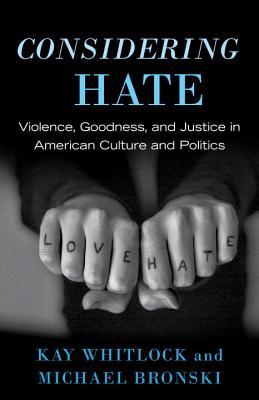Friday's Food for Thought: Considering Hate, by Kay Whitlock and Michael Bronski
June 12, 2015I've taken the last couple of weeks to (slowly) read and mull over Considering Hate: Violence, Goodness and Justice in American Culture and Politics. The essay was co-authored by Kay Whitlock (writer and racial, gender, queer and economics rights activist) and Michael Bronski (political organizer, writer and professor at Harvard University), both of whom wanted to tackle the psychological and theological underpinnings of why it is that we hate and the political and cultural ramifications of our enmity. (They offer extensive analysis of more than a century of American cinema, for any film buffs reading this.) Whitlock and Bronski do not offer concrete solutions to the inequality and injustice rampant in American society, but they suggest ways we can change how we think about these issues and, as a result, begin working toward progress.
For those who dislike academic writing, beware; at just under 150 pages, this is dense reading. If you don't mind that, the book provides plenty to chew on within its relatively low page count.
À la my post about Chasing the Scream by Johann Hari, I'm not even going to attempt to review this book. Instead, here are a few particularly good passages that got my neurons firing:
"In the United States, rape, sexual assault, child sexual abuse, coercion, and harassment are subject to criminal prosecution, including prosecution as a hate crime. These legal remedies, though seldom pursued, support the idea that American society does not tolerate this violence. ... In its common form the rape story becomes an idealized tale of public virtue and individualized evil. Reality reveals this to be untrue. This idealized concept of justice coexists with a rape culture in which sexual violence is tolerated as an everyday aspect of private and public life. Rape culture is defined by attitudes and cultural messages that continually downplay the extent of sexual violence, stigmatize those who are assaulted, and celebrate male sexual aggression. When rape is acknowledged at all, it is often described as a violent form of sexism that affects all women equally. That is a simplification and a distortion." - pg. 38, Considering HateAs a regular social media user, the following passage really hit home for me (italics mine):
"Who bears responsibility, and what kinds of responsibility, for addressing massive harm? Who is responsible for dismantling the policies and practices that produce it? The most common response to these questions entails people proclaiming 'not me,' quickly followed by public displays of outrage, always directed against others. Most people refuse to engage with these questions in any substantive moral way. ... When people acknowledge the existence of mass violence, they seldom grapple with the question of responsibility, which is often wrongly reduced to a question of legal culpability. In a culture that articulates a sharp division between good guys and bad guys, where almost everyone identifies as the former, this makes perfect sense. The hate frame allows people to morally disengage from considering how they are implicated in harming others." - pgs. 102-103, ibid.
"Anxiety and anger often arise in relation to the question of collective responsibility because politically, responsibility is linked to punishment. ... Responsibility must be separated from punishment. To do so opens new understandings of collective moral engagement and agency rooted in an ethic of interdependence rather than of retribution. The idea of moral agency must be detached from the act of coercive moralizing, so that it can be envisioned as action that can interrupt the harm inherent in systems of domination and violence. Rather than emphasizing guilt and blame, public focus might usefully shift to such concepts as societal accountability, healing, and redress." - pgs. 114-115, ibid.And I'll leave you with this. I think it's the most elegant explanation I've ever read for why "colorblind" policies are, for lack of a more fitting word, crap:
 |
| Page 107, ibid. |
Got anything to say about the passages I shared? Want to team up with me to overthrow systemic forms of injustice? Let's chat!







6 comments
It sounds like a book that you need to read at a specific time (not for light reading), but I totally want to give it a go.
ReplyDeleteThis sounds amazing. And I do like dense, academic writing if the page count isn't too high. ;) thanks for sharing this!
ReplyDeleteDefinitely not light reading at all, but I think you'd be really into it. Its emphasis on reframing what we mean when we talk about justice sounds right up your alley.
ReplyDeleteOf course! I hope you get to it. It was a really thought-provoking read.
ReplyDeleteI am not going to read your review yet because I don't want to know much before I read this myself. I just ordered it. It sounds amazing!
ReplyDeleteDon't be afraid to stretch it out over time... despite the low page count, it's VERY academic and not exactly light reading. I hope you enjoy it!
ReplyDelete